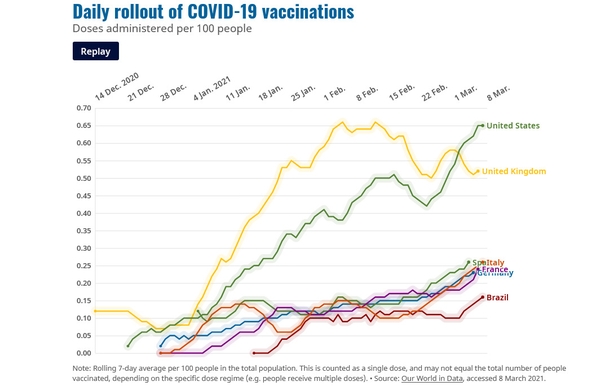The OECD has said "faster and more effective vaccination" across the world is now critical to ensure a recovery in the world's economy.
In its latest Interim Economic Outlook published today, the Paris-based think tank has revised upwards its forecasts for global growth by 1% to 5.6% this year.
But it cautions that much will depend on the effectiveness of vaccines against new strains of the coronavirus.
At press conference in Paris this morning, the OECD's chief economist Laurence Boone urged the world's governments to get on a "wartime footing" to speed up the production and rollout of vaccines.
The OECD forecasts that the Chinese economy will rebound by 7.8% this year before settling to 4.9% next year.
It said it expects growth in the US to be 6.5% this year and 4% next year reflecting its massive stimulus programme and fast vaccine rollout. The UK is also forecast to recover strongly this year with growth of 5.1% and 4.7% next year.
But the euro area is forecast to grow at a slower rate of 3.9% this year and 3.8% next year. The OECD said this reflects the slower pace of vaccine rollout in European countries.
The OECD has also said that a slower rollout of vaccines risks undermining the fiscal stimulus by governments to tackle the pandemic. A slower rollout means a slower lifting of restrictions and a diversion of government financial support into saving.

Laurence Boone also said "there are reasons to be concerned about inflation".
The US stimulus programme, the breakdown in some supply chains from factors like migrant workers being unable to travel and an increase in some commodity prices like oil have all contributed to inflationary pressures.
"We have long complained that inflation is too low," said Ms Boone. "So a little would be welcome."
However, Ms Boone said the OECD believed that the inflationary pressures are temporary as demand remains weak in many parts of the world's economy.






